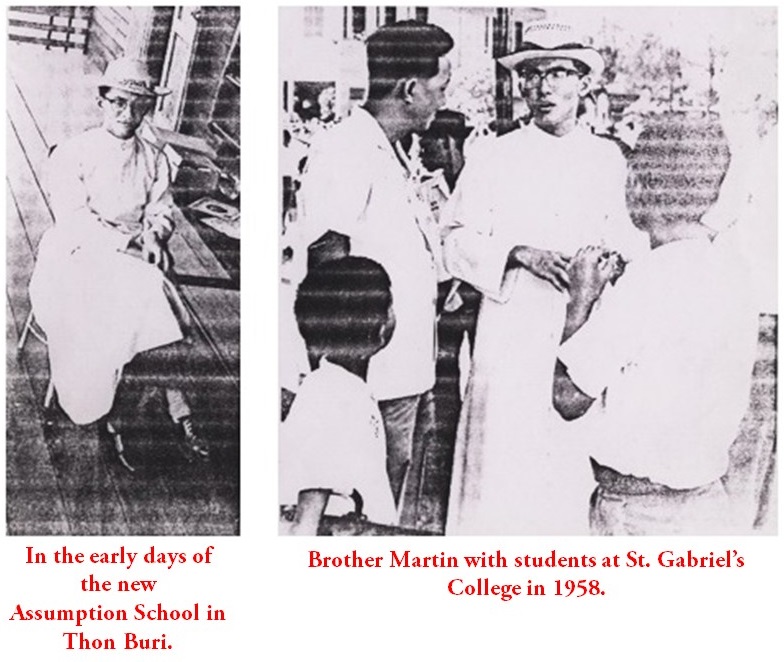Brother Martin: Salt of the earth*
SOFT-SPOKEN, withdrawn, a careful listener and better yet, a patent observer, Brother Martin Kamolimas takes his time about answering questions. Life is long and there are so many ramifications and sides to every proposition. But the direction is very clear in his mind, it is what he has dedicated 60 years of his life to and “No”, I have never considered doing anything else, nor would I want to.
As he talks, slowly and carefully, using well-measured out sentences to convey what he believer in, the hint of steel shows through as the discussion ranges around his early decision to dedicate himself “wholly and completely” to God’s work through education.
Not such a very big decision, but a natural one that took its course, he says, thinking back to his early youth as an only child, the son of a churchgoing Catholic father who worked for the State Railways of Thailand, and his mother, a sweet-natured housewife, Buddhist by belief, who had no objections to her son Prathip’s taking part in church activities from a very young age.
“Actually, it was my grandmother Soy on my father’s side, who taught me how to pray and told me Bible stories when I lay awake sleepless in my cot. My father, Sawasdi, an engineer was always traveling a lot to all the places in Thailand where the railroad needed him. Sometimes, when he knew he would stay longer in one place then another, we went along as a family and that’s how I discovered Lampang, Lop Buri and all the towns around Aranyaprathet, leading to the Thai/Cambodian border.“But Bangkok was ‘home’ and the place where my grandmother was that we all came back to. Later, when I began to attend school at St Gabriel’s College in Samsen, it was my grandmother Soy I could count on to wake me up early in the morning to be in time for early six o’clock mass. And when I was called on to help in the sacristy, she was there to get me up at 5:00 a.m., when the whole city still was bathed in the black velvet of night.
“It was in December 1951 during my last year at high school, when I was 18 that Our Lady of Fatima procession from Portugal stopped in Thailand, sparking a genuine religious revival, something that hadn’t been seen since the days before the World War and the occupation by the Japanese.
“I think this is when I definitely made up my mind to become a Brother and teach students about God I was also helped in making this decision by an earlier meeting and interview I had with Brother Michael, who had come to talk to the students at St. Gabriel the year before. He was a very impressive figure with his long white beard, sparkling eyes and open demeanour. He had come originally from France, served in Thailand and had been a missionary in India and was now the director of the seminary he had founded in Nilgiris.
“So when I made up my mind that I was ready to devote my life completely to the Church, I wrote to him and said. “I am ready”. That was 41 years ago and I packed my few things in a bag, said goodbye to my mother, father and grandmother and arrived at the seminary in South India in May, 1952.P. Martin Kamolmas, president of Assumption University, has a dream and it is all about education. “If you can teach one man a skill or a trade, you will have liberated him from poverty and want. And if you can teach many, you will have freed not only the nation but one day, the world.” SUMALEE SUKONTHAI reports.
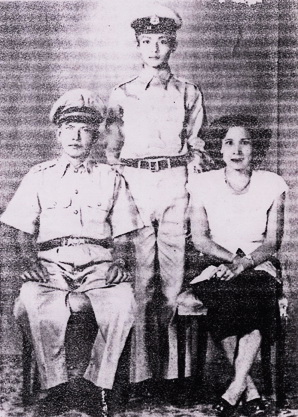 With his parents Sawasdi and Sangrien on April 2, 1952, on the eve of his departure for the seminary in Nilgiris, South India.
With his parents Sawasdi and Sangrien on April 2, 1952, on the eve of his departure for the seminary in Nilgiris, South India.

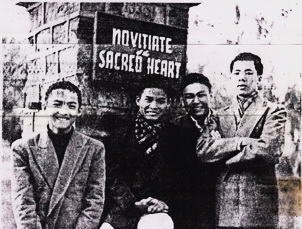
Young Prathip, far left, with other Thai students at the
seminary in Nilgiris.
“I stayed at the seminary for two years and entered Loyala College, attached to the University of Madras for four more years of study in general science subjects.”
Brother Martin says that learning and teaching were always very important to him. His mind, like a thirsty field waiting for the rains to fall, welcomed any new knowledge and the world in the late 1950’s was the scene for such extraordinary scientific discoveries and happenings.
He remembers the first Sputnik being sent aloft in 1956 and how all the students in the college followed the big event through the newspapers. “But everything was new and exciting then and I couldn’t read fast enough to keep up with it all. When I came back to Thailand with my BSc degree, I was made an associate master at what we called a minor seminary at Si Racha. I taught all the secular subjects, like the sciences and mathematics.
“A year later, I was transferred to Saint Louis School in Chachoengsao and in 1961 to the newly-opened Assumption School in Thon Buri. And that was really primitive; a series of wooden houses serving as classrooms and homes for the Brothers.
“I stayed there four very rewarding years before I was brought back to my old alma mater, St. Gabriel’s College in Samsen, teaching moral and secular subjects. It was during this time that I was elected a Provincial Superior for three years.
“Then, I had a glorious surprise awaiting me: during the early 1970’s the University of Southern California had introduced special training courses at the International School for the US military personnel and expatriates who wanted to continue with their education and I was allowed to join. It was wonderfully exciting and I wanted more, so I applied for admission to Stanford University to study for two master degrees; one in international development education and the other in the social sciences in education and they accepted me.”
Brother Martin today in his robes as president of Assumption University (ABAC).
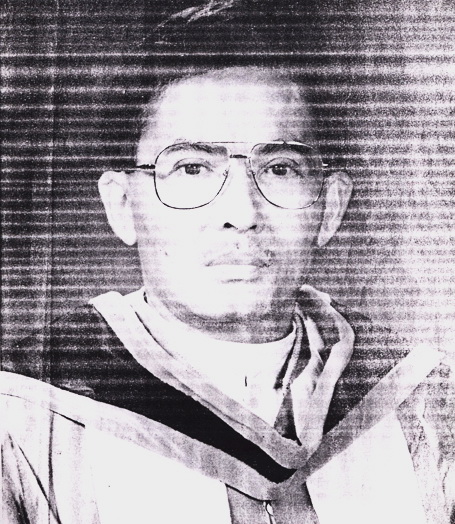
‘We are a very business-oriented university because that’s where the present demand is; Thailand needs professional people to carry on and support the country’s development’
Brother Martin, his eyes alight with the remembrance of good souvenirs of his stay in California, says it was, all-in-all a marvelous two years for him; “So many good friends, so many happy excursions, like the one to Lake Tahoe where I learned how to ski for the first time, and the encounters with eminent professors who had so much to teach me.”
It was with some regret but an awareness that this was his duty that he answered the call from his Superior to return to Bangkok as soon as possible; there was a shortage of staff and they needed him as a teacher at ABAC, which was now in its tenth year.
Having started small with only 51 students and two classrooms in 1969, the idea of Brother Philip Amnuay Pinratana and Brother Bernard Mary, both of St. Gabriel, the college had grown and now numbered 500-to-600 students. Most of the teachers were part-time but it was becoming obvious that this would on longer do and more substantial arrangements had to be made. Brother Martin with his background in teaching and education was needed now more than ever.
Looking back, Brother Martin says that the period under discussion 1976-to-1978 – when he was in the States attending Stanford, was a crucial one for Thailand. “No one was very sure about the future and whether the atmosphere at the time was conducive to privatization, particularly in education. Of course, as it worked out, it became so and we didn’t have to wait longer than 1979/1980 to get the signal from the government that the more students to graduate from accredited institutions, the better. The country needed them to guide Thailand’s future development. So you see, it was the right time for ABAC and the right time for me to come back and join the faculty.”
When ABAC’s president was asked to join the government of Prime Minister Prem Tinsulanonda as Minister of Science and Technology, Brother Martin was asked to replace him, a position he has held ever since. But ABAC under his administration is a far different institution from what it was. Today, it has eight faculties and five graduate schools, a student body of 12,000 and a permanent teaching staff of over 570.
“We are a very business-oriented university because that’s where the present demand is; Thailand needs professional people to carry on and support the country’s development and we see that as a role we can provide.”
Fourteen years ago when he assumed the presidency of ABAC, it was very hard for graduates to find jobs. “There was just no work available and all the training they had received went for nought. That’s way, as we expanded we kept looking and measuring the market’s needs and they all seemed to be directed towards business, economics and international development, so this is what we have concentrated on, adding new faculties as we have been able, especially in the areas of science and engineering.
Of ABAC’s 10,276 graduates, most of them have been from the Faculty of Business Administration, which takes in marketing, general management, finance and banking, accounting, business computer, advertising management, hotel management and international business management. But there is more to ABAC than that, he says, listing the faculties of insurance, arts, nursing, science and technology, engineering, communication arts, law and biotechnology, plus the graduate schools of business administration, science and technology, arts and philosophy, leading to a degree in computer information systems and computer and engineering management.With expansion to meet the country’s demand for brighter and better educated professionals, Brother Martin says that ABAC will continue to grow. At the end of 1993, the university will move to a new campus on the Bang-Na Trat highway, he says, vaunting the well-accepted fact that “ABAC may be easier to get into but more difficult to graduate from with any amount of success”
For Brother Martin, the days are still too short for him to do everything that he wants. “But that’s alrught”, he says, “I have never questioned that I made the right decision to dedicate my life to education and I am not going to change it now”

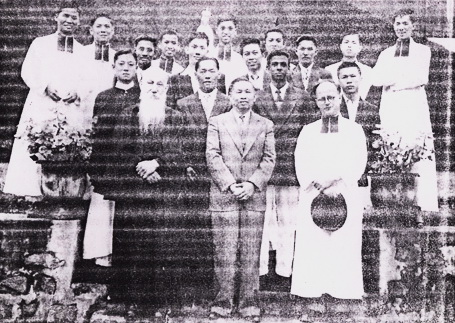
At the Nilgiris seminary in 1953 when the Thai Ambassador to India came to visit. Brother Michael
(with long white beard) director of the seminary, played an important part in Prathip’s decision
to enter the church. That’s Prathip, third from right, in the last row.
